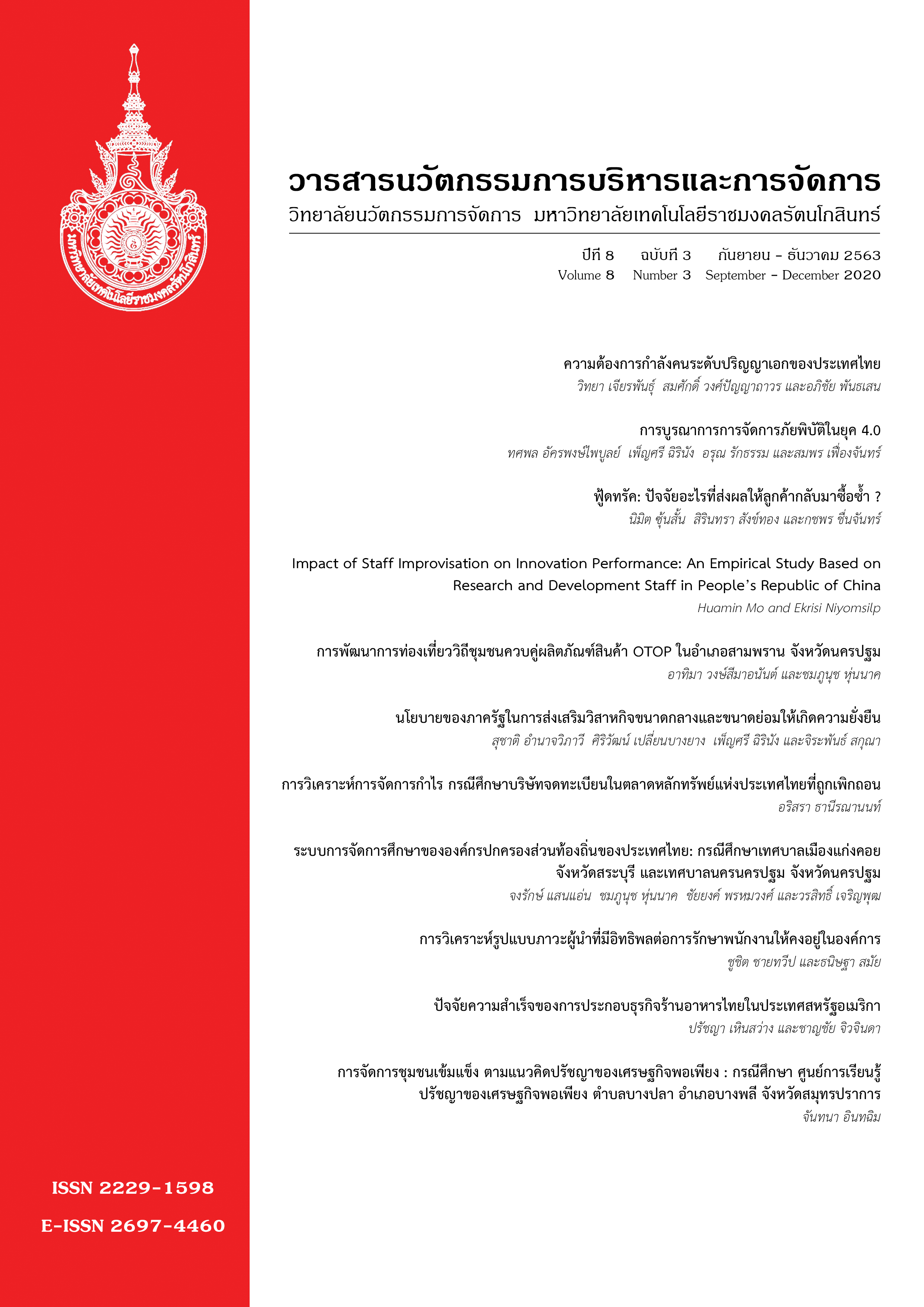Impact of Staff Improvisation on Innovation Performance: An Empirical Study Based on Research and Development Staff in People’s Republic of China
Main Article Content
บทคัดย่อ
This study was developed a theoretical model to account for the effect of organization improvisation on innovation performance by theoretical analysis and literature review. Staff improvisation was defined that, employee utilize immediately available resource to produce creative results in non-routine or unexpected ways. With the objectives to identify the connotation of staff improvisation through literature research and to examine the impact of staff improvisation on innovation performance. Results from a sample of 213 Chinese staff support the study hypothesis, and show that staff improvisation positively affected their innovation performance. Furthermore, the three sub-dimensions of improvisation, including spontaneity, creativity and utilizing available resource, could significantly promoted their creative performance. The results of this research offer guidance to managers about encouraging organization improvisation.
Article Details
ข้อความและบทความในวารสารนวัตกรรมการบริหารและการจัดการ เป็นแนวคิดของผู้เขียน ไม่ใช่ความคิดเห็นและความรับผิดชอบของคณะผู้จัดทำ บรรณาธิการ กองบรรณาธิการ วิทยาลัยนวัตกรรมการจัดการ และมหาวิทยาลัยเทคโนโลยีราชมงคลรัตนโกสินทร์
ข้อความ ข้อมูล เนื้อหา รูปภาพ ฯลฯ ที่ได้รับการีพิมพ์ในวารสารนวัตกรรมการบริหารและการจัดการ ถือเป็นลิขสิทธิ์ของวารสารนวัตกรรมการบริหารและการจัดการ หากบุคคลใดหรือหน่วยงานใดต้องการนำทั้งหมดหรือส่วนหนึ่งส่วนใดไปเผยแพร่ต่อหรือกระทำการใดๆ จะต้องได้รับอนุญาติเป็นลายลักษณ์อักษรจากวารสารนวัตกรรมการบริหารและการจัดการก่อนเท่านั้น
เอกสารอ้างอิง
Akgün, A. E., Keskin, H., Byrne, J. C., & Gunsel, A. (2011). Antecedents and results of emotional capability in software development project teams. Journal of Product Innovation Management, 28(6), 957-973.
Bell, G. G. (2005). Clusters, networks, and firm innovativeness. Strategic management journal, 26(3), 287-295.
Dehlin, E. (2013). Fleshing out everyday innovation: phronesis and improvisation in knowledge work. In Handbook of organizational and managerial innovation. Edward Elgar Publishing.
Guoxiang, R., Jianqi, M., & Liqiang, M. (2015). The Cross-level Research about Effect Mechanism of Employees' Improvisation on Individual Innovation Performance: Empirical Evidence from New Energy Start-up Firms. China Soft Science, 1.
Jantunen, A. (2005). Knowledge‐processing capabilities and innovative performance: an empirical study.European Journal of Innovation Management, 8(3): 336-349.
Jun, W., Guangming, C., & Ruochen, J. (2016). On Formation Mechanism of Organizational Improvisation: Based on Social Network and Organization Learning Theories. Foreign Economics & Management, 38(02), 33-48.
Kamoche, K., Cunha, M. P. E., & Cunha, J. V. D. (2003). Towards a theory of organizational improvisation: Looking beyond the jazz metaphor. Journal of Management Studies, 40(8), 2023-2051.
Liu, Q. H., & Wang, T. (2010). Why companies improvise: a test on the strategic decision-making manners of Chinese companies [J]. Journal of Business Economics, 222(4), 25-32.
Leybourne, S., & Sadler-Smith, E. (2006). The role of intuition and improvisation in project management. International journal of project management, 24(6), 483-492.
Magni, M., Provera, B., & Proserpio, L. (2010). Individual attitude toward improvisation in information systems development. Behaviour & Information
Pina e Cunha, M., Vieira da Cunha, J., & Kamoche, K. (1999). Organizational improvisation: What, when, how and why. International journal of management reviews, 1(3), 299-341.
Vera, D., & Crossan, M. (2005). Improvisation and innovative performance in teams. Organization science, 16(3), 203-224.
WU, D., & QIU, Y. (2010). The Research of the Relationship between Team Improvisation and Innovation Performance Dong [J]. Scientific Management Research, 6.
Xiaoli, J., & Yaolong, C. (2013). The Research of the Relationship between R&D Team Improvisational Ability and Team Innovation Performance——The Regulating Effect of Shared Mental Model [J]. Science & Technology Progress and Policy, 14.


